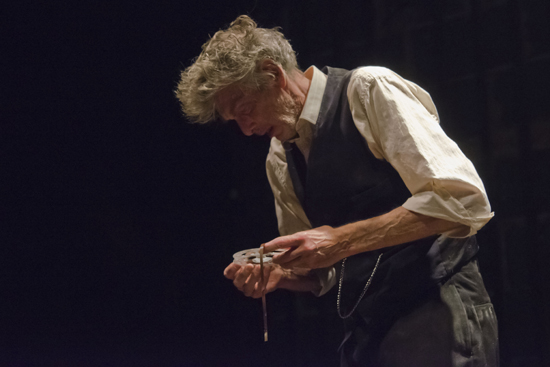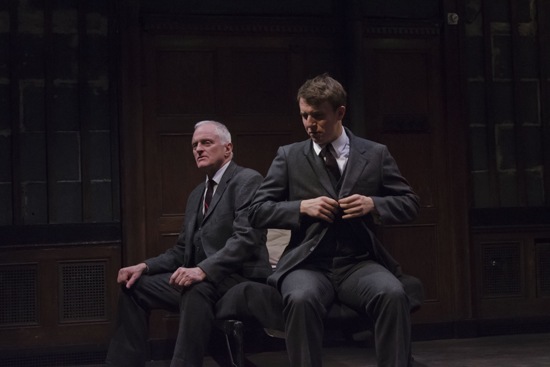Masterpieces of Menace, Regret
BCAP opens with Beckett, Pinter one-acts

Sidney Friedman, a College of Fine Arts adjunct professor, is the lone actor in Samuel Beckett’s Krapp’s Last Tape, one of two plays in BCAP’s An Evening of One Acts at the BU Theatre. Photos by Kalman Zabarsky
The last time Sidney Friedman performed on stage, he says, “Alexander was king.” But the College of Fine Arts adjunct professor, who at 75 has directed more than 90 plays during his career, gladly agreed to take on Samuel Beckett’s Krapp’s Last Tape, a one-act, single-character play in which an elderly man comes to terms with his many selves over a life in which grandiose dreams and resolutions collide with stark realities.
His performance in a role embraced over the decades by such actors as Harold Pinter, Brian Dennehy, and Michael Gambon will share the bill with Pinter’s one-act play The Dumb Waiter. Presentation of the back-to-back plays by the Boston Center for American Performance (BCAP), the professional arm of the CFA School of Theatre, runs tonight through November 23. Directed by Clay Hopper (CFA’05), BCAP artistic associate and CFA lecturer in directing and theatre arts, the production kicks off BCAP’s seventh season by spotlighting two of the 20th century’s most celebrated playwrights, Beckett and Pinter, both of them recipients of the Nobel Prize in Literature. Performances will be at the Boston University Theatre, Lane-Comley Studio 210.
In Pinter’s The Dumb Waiter, two characters, Ben (Michael Hammond) and Gus (Nicolas Chuba), are biding their time in a sparsely furnished basement awaiting their next, unspecified “job” (which ultimately becomes clear to the audience as the mood in their claustrophobic lair grows more and more menacing) while a series of mysterious food orders arrives in a dumbwaiter. (Note: for those not of a certain age, a dumbwaiter is a small elevator meant to carry items other than people. Their once-common existence spawned many a slapstick plot twist for the likes of the Marx Brothers and the Three Stooges.) In Pinter’s play, the arrival of the dumbwaiter and its seemingly mundane contents creates an ominous, rather than comic, air.
Claustrophobic in a more existential way, Krapp’s Last Tape, which had its North American premiere in 1960 at the Provincetown Playhouse, was described by Nation theater critic Robert Hatch as an “outrageous play.” We meet Krapp on his 69th birthday, as Hatch writes, “A feeble, nearly blind and deaf, solitary and half-drunk man, crouching in a squalid room, subsisting on bananas and playing to himself (commenting the while) old tape recordings of his own voice—recordings, moreover, that consist in no small part of comments on still earlier tapes. Is this theater? Well, yes, it is; outrageous, of course, but very much theater.”
Friedman, who came out of a kind of acting retirement to inhabit Krapp and the parade of relatives, women, and others the character gives voice to, believes the play is Beckett’s most accessible and one of his most poignant. BU Today spoke with Friedman recently in his CFA office, as he took a break from teaching and rehearsals.

BU Today: Have you ever directed or acted in Krapp’s Last Tape?
Friedman: I directed Krapp’s in the ’60s and thought it would be a great idea to use videotape. It was a terrible idea—the screen always trumped the actor. The script I worked from back then had been in my library for years, but I recently downsized and donated a bunch of books, including that one, to the School of Theatre script library. When Clay [Hopper] went to get a script, he pulled out my old one with all my markings on it.
Is this a demanding play for the audience?
Beckett is very cryptic but very complete. He doesn’t say much, but all the clues are imbedded in the script. What’s fun for the audience is, for example, when age 39, Krapp has just listened to a tape of Krapp in his 20s, and then we have the old Krapp, and see the ways in which he’s the same bloody person every time and the ways in which he’s changed. “It’s hard to believe,” Krapp says at one point, “that I was ever that young whelp.”
Does the play resonate in different ways for young and older people?
Oh, absolutely. It’s a different play for someone over 60. When young Krapp is talking about a landlady who sings at night and wonders, “Will I sing at her age if I ever get to her age,” death to him is remote. That sense of reviewing your life, the regret that goes with that, is more poignant for people closer to death.
How does this play compare to Beckett’s other dramas?
This Beckett is less bleak. The vision is less bleak, and he allows a little more empathy for the character. It’s a cautionary tale in a way. Krapp has isolated himself, cut himself off from everybody. But it started years ago. He mentions seven or eight women, but they’re all gone. And remember that the play was written in the 1950s, when life expectancy was lower, so Krapp at 69 is the equivalent of someone in his late 70s today.
Do you identify with him?
Of course I identify with him. The play asks me to identify with parts of myself of which I’m not particularly proud. And I don’t think it’s a play about memory. It’s a play about regret. But there is some consolation at the end. In the same way, think about Godot. He’s not coming. But you can’t give up that hope.
Have you written any plays?
When I was a young whippersnapper, a friend and I wrote what we thought was a great musical. We went to a friend, the sister of a famous playwright, to talk about funding. We were so sure it was great, but she told us that no one knows what’s going to succeed, it would be as if everyone knew which stock would go up. If they did, there wouldn’t be a stock market.
What did she think of your musical?
Not much.
Performing live theater, particularly when you’re the only actor on stage, requires a grueling schedule. How are you handling the demands of performing?
Theater is a younger person’s game. George Abbott [the American stage and film director and playwright] directed until he was 100. But I marvel at my colleagues who go into the building by 9 or 10 in the morning and don’t come out until 11 at night. They teach classes, direct shows. That couch you’re sitting on is my napping couch.
An Evening of One Acts: Krapp’s Last Tape & The Dumb Waiter runs through November 23 at the Boston University Theatre, Lane-Comley Studio 210, 264 Huntington Ave., Boston. Performances are Wednesdays and Thursdays at 7:30 p.m., Fridays and Saturdays at 8 p.m., and Sundays at 2 p.m. Tickets are $20 general admission and $15 for students, senior citizens, and groups of 10 or more. Members of the BU community are eligible for one free ticket with a valid BU ID, at the door, subject to availability. Tickets and further information are available here or by calling the box office at 617-933-8600. To get to the BU Theatre, take the MBTA Green Line E trolley to Symphony or the Orange Line to Massachusetts Avenue.
Comments & Discussion
Boston University moderates comments to facilitate an informed, substantive, civil conversation. Abusive, profane, self-promotional, misleading, incoherent or off-topic comments will be rejected. Moderators are staffed during regular business hours (EST) and can only accept comments written in English. Statistics or facts must include a citation or a link to the citation.